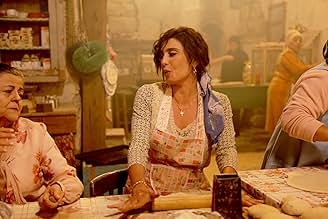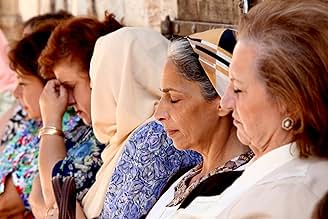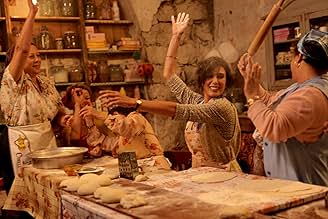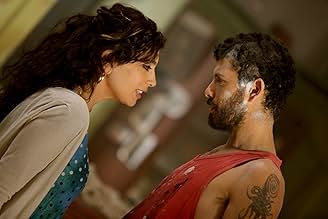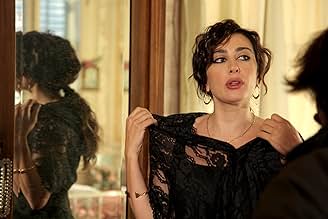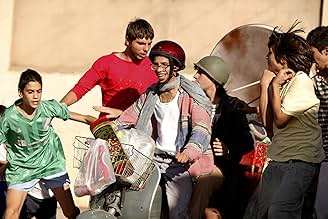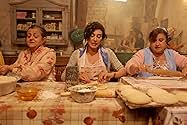Un gruppo di donne libanesi cerca di allentare le tensioni religiose tra cristiani e musulmani nel loro villaggio.Un gruppo di donne libanesi cerca di allentare le tensioni religiose tra cristiani e musulmani nel loro villaggio.Un gruppo di donne libanesi cerca di allentare le tensioni religiose tra cristiani e musulmani nel loro villaggio.
- Regia
- Sceneggiatura
- Star
- Premi
- 9 vittorie e 5 candidature totali
- Abou Ahmad
- (as Mohammad Akil)
Recensioni in evidenza
The script is a gem. The team of writers, including director and co-star Nadine Labaki, is just great. It pulls us from comedy through tenderness and tragedy. The acting troupe is very good, very believable. It seems to be shot on location, sets are real enough to make you believe you are there.
The cinematography is great, really showing the town as it is, and placing you very much in the middle of the scenes. Nice lighting, color balance is warm and soft, giving a very homey look to the locations.
It's all too seldom that we who are not in the middle of a internal civil war such as this get to see a window into the world that is trying to hang on to it's sanity, not yet having fallen over the precipice into full scale chaos.
This is a very wonderful, funny, and poignant window into that world, told by people who are very close to the real situation. It could not have been invented by a California filmmaker.
It falls into the classes of films like "The Debt" and "of Gods and Men", stories of middle eastern conflict that are not set pieces, or play to western stereotypes of what is happening there, though it is much 'lighter' and less of a drama than those. This has much more light hearted nature than those films.
9 stars out of ten, for wonderful original storyline, wonderful unknown cast, good acting, great cinematography, nice weaving of humour and pathos, contemporary story, without being trite, solid editing. Also just a good movie, beyond all the technical nonsense.
So if you have read this far, saw those other films, and liked them, you likely will like this better. Again, hard to imagine you will be disappointed in this gem.
I left the theater greatly touched, happy, sad, and alive. I'm not an expert, but as a mother and as a woman, I hope Ms. Labaki's message of love, peace, and tolerance I took from her work can reach and change many. Good luck Ms. Labaki and thank you.
The next category you'll find in Where Do We Go Now? Is comedy, which dominates a large part of the first act and is also sprinkled throughout the rest of the film. I was so charmed by the group of scheming wives who are trying to find ways to subtly control the men of the village. Then there are the Ukranian dancers who add another element of humor to the film which I found surprisingly delightful. But at the heart of the film is a dramatic story that echoes the actual political conflict that has plagued the Middle East for millennia. I was mesmerized by this entire story and how even in this remote village there is a constant threat of aggression taking hold and leading the people to violence. On the one hand you feel the general frustration with the fact that these two groups can't maintain peace, but on the other hand you can see how one small act confirms all their prejudices and snowballs into disaster. Where Do We Go Now? Is a marvelous movie that made me laugh and cry multiple times, which shows just how effective its emotional story is told.
The movie premiered at the Cannes Film Festival, and won the people's choice award at the Toronto International Film Festival. Nadine, who also acts in the film, may be accused by some quarters of trivializing the conflict between the Abrahamic faiths with her comic take on religion, complete with a climax reminiscent of a Cheech and Chong flick. However, the tone of the film remains somber throughout, and the viewer is often reminded of the toll of the conflict on both sides of the religious divide, with glimpses of intermittent sectarian strife.
The intelligent dialogue, interspersed with repartee between the female characters is refreshingly entertaining, offering a peek inside the (mostly) segregated Arab society and humanizing a population segment often portrayed as meek and subservient to the other sex.
Nadine's second directorial venture after Caramel continues to court controversy, with an ending which Labaki acknowledges might "raise a lot of polemics. It might upset people who are a bit fanatic or too conservative..." By the end of the film, Nadine is sure to rouse some thought-provoking questions in the viewers mind, fulfilling the obligation to her craft and pushing the envelope. Where Do We Go Now has been chosen as the Lebanon's 2011 entry in the best foreign language film category for the Academy Awards.
Lo sapevi?
- QuizThe highest grossing Arabic speaking release in the territory of Lebanon.
- Citazioni
[first lines]
Amale: [narrating] The story I tell is for all who want to hear. A tale of those who fast, a tale of those who pray, a tale of a lonely town, mines scattered all around. Caught up in a war, split to its very core. To clans with broken hearts under a burning sun. Their hands stained with blood in the name of a cross or a crescent. From this lonely place, which has chosen peace, whose history is spun of barbed wire and guns.
- ConnessioniFeatured in Fokus på Film fra Sør (2011)
- Colonne sonoreDanse Funèbre
Written by Khaled Mouzanar
Performed by Khaled Mouzanar
I più visti
- How long is Where Do We Go Now??Powered by Alexa
Dettagli
- Data di uscita
- Paesi di origine
- Siti ufficiali
- Lingue
- Celebre anche come
- Where Do We Go Now?
- Luoghi delle riprese
- Aziende produttrici
- Vedi altri crediti dell’azienda su IMDbPro
Botteghino
- Budget
- 6.700.000 USD (previsto)
- Lordo Stati Uniti e Canada
- 531.997 USD
- Fine settimana di apertura Stati Uniti e Canada
- 15.382 USD
- 13 mag 2012
- Lordo in tutto il mondo
- 7.507.008 USD
- Tempo di esecuzione1 ora 50 minuti
- Colore
- Mix di suoni
- Proporzioni
- 2.35 : 1
Contribuisci a questa pagina



